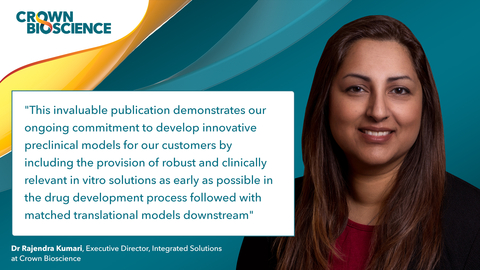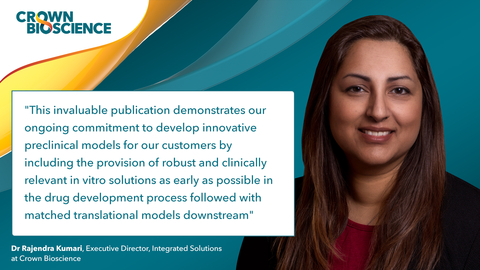SAN DIEGO--(BUSINESS WIRE)--Crown Bioscience, a global contract research organization (CRO), and JSR Life Sciences company, announced today their newly published study in PLOS ONE, a journal of the Public Library of Science (PLOS), demonstrating the establishment and application of a highly clinically relevant 3D in vitro PDX-derived organoid (PDXO) biobank for higher-throughput screening for cancer drug discovery.
This study aligns well with the recent Senate Bill 5002, titled FDA Modernization Act 2.0, introduced in the United States Senate, which authorizes the use of alternatives to animal testing, including cell-based assays for the purposes of drug and biological product applications.
“This invaluable publication demonstrates our ongoing commitment to develop innovative preclinical models for our customers by including the provision of robust and clinically relevant in vitro solutions as early as possible in the drug development process followed with matched translational models downstream,” commented Rajendra Kumari, PhD, Executive Director of Integrated Solutions at Crown Bioscience. “Organoids maintain a high degree of clinical relevance that cannot be achieved with traditional 2D cell lines and other 3D systems. As a result, in vitro drug screening with PDXOs represents a highly physiologically relevant platform that better predicts patient response making these ideal alternatives to animal testing.”
This new study reports on the largest living, commercially available PDXO biobank—with approximately 550 tumor organoid models derived from a collection of matched PDXs representing 17 different types of carcinomas. The main findings of the study include:
- The biological equivalence and interchangeability between PDXOs and parental PDXs were confirmed based on genomics, histopathology, and pharmacology.
- PDXOs in 384-well format assays are reliable, robust, and suitable for higher-throughput screening for rapid identification of drug sensitivity and drug combination strategies, including for matrix screening, encompassing both lead compounds and indications.
- PDXOs are amenable to engineering, such as gene editing to significantly broaden large-scale research applications, including in vitro/in vivo imaging analysis.
- The successful co-culture of PDXOs with PBMCs and CAR-T cells to investigate immune modulation and tumor killing.
This large biobank provides a unique collection of matched in vitro and in vivo preclinical patient-derived models which can be accessed via Crown Bioscience’s online databases OrganoidBase™ and HuBase™. This powerful translational tool has distinct advantages over other systems such as providing higher throughput with faster results as compared to in vivo models alone, with robust and renewable assay performance that reflects reproducibility of other in vitro systems. In vitro drug screening with PDXOs can rapidly be integrated into early drug development and interchangeably with translational studies and improved predictions of clinical outcome.
To read the full publication entitled “A living biobank of matched pairs of patient-derived xenografts and organoids for cancer pharmacology”, follow this link.
###
About Crown Bioscience
Crown Bioscience is a global CRO that provides preclinical and translational platforms to help our customers advance their research and development in oncology, immuno-oncology, and immune-mediated inflammatory diseases (IMID). Crown Bioscience is the exclusive preclinical CRO to offer tumor organoid services, utilizing Hubrecht Organoid Technology (HUB) to establish 3D in vitro tumor organoids that have been shown to faithfully recapitulate the phenotypic and genetic features of their original tumor, and these models are playing an increasingly important role in cancer drug discovery, particularly in identifying anticancer agents with improved translational potential. In addition, Crown Bioscience has developed OrganoidBase™, an extensive searchable biobank consisting of hundreds of PDXO models with information on histopathology, IC50, and genomic and transcriptomic analysis data associated with drug response. Crown Bioscience is focused on helping our customers develop novel therapies to help patients receive the right treatment at the right time. Founded in 2006, Crown Bioscience has ten facilities across the US, Europe, and Asia.
For more information or to get in touch, please visit: www.crownbio.com




